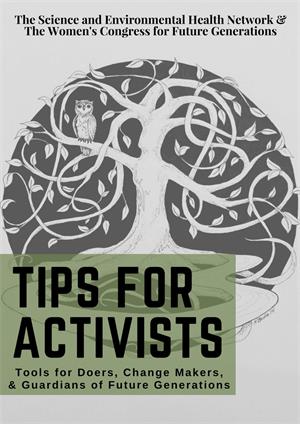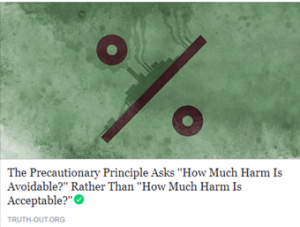April 2018 Networker: The Public Trust Doctrine


The Public Trust DoctrineVolume 23 (2) April 2018
"The Public Trust is actually an expression of the most fundamental responsibility of government: to care for all the things we share, the things that are part of the commonwealth and the public health. That includes drinking water, parks, wildlife, roads, bridges, public schools the atmosphere and so much more."
Friends of SEHN,
Barry Lopez, the great writer, once said “Free market capitalism is an experiment, of course, but so is democracy.”
***
We’ve been running an experiment in the role of government for the past two hundred years. The experiment was testing the hypothesis that government’s primary responsibility was to get out of the way of the free market and to grow the economy. The results of that test are conclusive: government and the free market have failed to protect the basic necessities of life—air, drinking water, healthy soils, public health and essential norms of justice.
Given the failure of that experiment, it is time to use a different guiding principle in our democracy than economic growth at all costs.
In this case, we don’t have to look very far, or even reinvent the wheel, for a different approach to government. It exists as an ancient precept of law that can be traced back to the Roman Empire, through the Magna Carta, and on to very recent court cases. It offers an approach to governance that stands a far better chance of protecting the commonwealth and public health than leaving it to the dead hand of the free market. This approach, formally known as the Public Trust Doctrine, stands for the proposition that the commons (traditionally shorelines and submerged lands), are held for the public in trust by government. The commons are to be stewarded for present and future generations.
The Public Trust Doctrine was established so no one (king or corporation) could keep the public from access to fishing and navigation. The rationale for the Public Trust was that people had a right to access the commons. When they were denied access to the tidal waters and submerged lands, they couldn’t obtain the essential necessities for a livelihood.
This basic idea of the Public Trust Doctrine has been extended beyond the economic necessities of transportation and fishing to cover access of shorelines and waterbodies for the recreational benefits provided by these waterways and adjacent lands.
Recently, the Public Trust Doctrine has been expanded to commons assets other than water bodies. Young people are bringing lawsuits in state and federal courts charging that government has a public trust responsibility to reduce greenhouse gases to stabilize the climate. These young people, as beneficiaries, are making the case that the atmosphere is part of the public trust and that government, as the trustee, has a fiduciary duty to protect the atmosphere from climate change.
We at SEHN and the Women’s Congress for Future Generations are advocating a much wider view of the Public Trust Doctrine: it is actually an elegant approach to the role of government. The Public Trust is an expression of the most fundamental responsibilities of government: to care for all the things we share, the things that are part of the commonwealth and the public health. The commons include drinking water, parks, wildlife, roads, bridges, public schools the atmosphere and so much more. As the earliest advocates of the Public Trust Doctrine recognized, the commons are the foundation of the economy. Without the road to market, farm products have little value. Without clean drinking water for the city of New York there is no city. And on it goes.
Carolyn Raffensperger Executive Director
RSVP for the Spring Luncheon
Please join us for brunch May 12
th
where we will have an opportunity to meet Judge Margaret Marrinan and the lawyer representing the citizens of White Bear Lake, Katie Crosby Lehmann. The judge will share her thoughts on the role of science in the law. The case is not only a clear articulation of the public trust doctrine but a brilliant exposition of how science best serves justice. Join us for a lively discussion about the key responsibilities of government and how it might shape our political landscape in this time of political chaos and upheaval. Let’s design the next experiment in democracy!


If you have ever felt compelled to action, but were unsure how to enact change in your own community (or even if you have), this is for you. Stay tuned in the next month to receive the first activist's tip sheet to work effectively in your community, and informational arrows pointing you in the direction of action. We at SEHN and the Women's Congress believe in empowering our communities through people like you.
SEHN in the News
Peter Montague, SEHN Fellow, was published on Truth-Out.org with his latest article on a renewed call for the precautionary principle and how the principle came to gain footing here in the United States. Read More
SEHN board chair, Madeleine Scammell, is behind the important research on a silent killer in El Salvador which was recently aired as a piece of PBS Newshour.
Ann Manning, Associate Director of SEHN, was recently quoted in Teen Vogue's excellent overview of banks investing in oil pipelines like Dakota Access or Enbridge's Line 3.

(Image: Jared Rodriguez/Truthout)

(Image: Boston University School of Public Health)

(Image: Teen Vogue.com)

The Science & Environmental Health Network | moreinfo@sehn.org | SEHN.org




